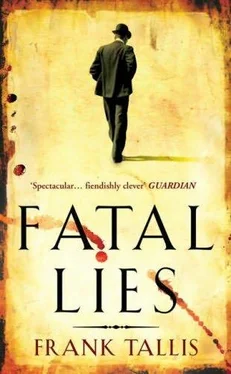Frank Tallis - Fatal Lies
Здесь есть возможность читать онлайн «Frank Tallis - Fatal Lies» весь текст электронной книги совершенно бесплатно (целиком полную версию без сокращений). В некоторых случаях можно слушать аудио, скачать через торрент в формате fb2 и присутствует краткое содержание. Жанр: Исторический детектив, на английском языке. Описание произведения, (предисловие) а так же отзывы посетителей доступны на портале библиотеки ЛибКат.
- Название:Fatal Lies
- Автор:
- Жанр:
- Год:неизвестен
- ISBN:нет данных
- Рейтинг книги:3 / 5. Голосов: 1
-
Избранное:Добавить в избранное
- Отзывы:
-
Ваша оценка:
- 60
- 1
- 2
- 3
- 4
- 5
Fatal Lies: краткое содержание, описание и аннотация
Предлагаем к чтению аннотацию, описание, краткое содержание или предисловие (зависит от того, что написал сам автор книги «Fatal Lies»). Если вы не нашли необходимую информацию о книге — напишите в комментариях, мы постараемся отыскать её.
Fatal Lies — читать онлайн бесплатно полную книгу (весь текст) целиком
Ниже представлен текст книги, разбитый по страницам. Система сохранения места последней прочитанной страницы, позволяет с удобством читать онлайн бесплатно книгу «Fatal Lies», без необходимости каждый раз заново искать на чём Вы остановились. Поставьте закладку, и сможете в любой момент перейти на страницу, на которой закончили чтение.
Интервал:
Закладка:
Haussmann's companion looked somewhat embarrassed.
“Not me, sir. I'm just the driver.”
“No,” said Becker. “You are to go too.”
“Me?” said the driver, touching his chest in disbelief.
“Yes. That is what Inspector Rheinhardt said: ‘Tell my men to come up here at once.’
“Has someone been injured, sir?” Haussmann asked.
“No.”
“Then what is he doing in the infirmary?”
“At this precise moment, I believe he is conversing with Nurse Funke. Now, I trust you will excuse me, gentlemen. Albert, the infirmary, please.”
Becker bowed, turned sharply on his heels, and walked off toward the courtyard entrance. Albert muttered something under his breath. It sounded like an obscenity, but was rendered unintelligible by the abrasive grinding of a persistent cough.
“Permission to report,” he uttered between rasps. “This way, sir.”
Haussmann did not follow the old soldier but stood quite still, watching the receding figure of the deputy headmaster. He felt uneasy, troubled. Why did the inspector want the driver? Did he need to lift something heavy? And there was something about that message… “Tell my men to come up here at once.” It wasn't the sort of thing that Rheinhardt would say. Rheinhardt almost always phrased his orders as if he were simply making a polite request: “Would you be so kind… I would be most grateful if…”
“Are you coming?” It was the driver.
Haussmann did not reply. His gaze remained fixed on the deputy headmaster, whose pace seemed to be quickening. Once he was through the archway, the wind caught his gown and it rose up, billowing and flapping. Haussmann cocked his head to one side. He thought he could hear something-a tonal inflection-that dropped with the soughing. At first he wondered whether he was imagining things, but then it came again, this time more clearly: voices-a faint cry.
“Haussmann…”
“Haussmann…”
“Deputy headmaster! Dr. Becker!”
Through the archway, only the sky and hills were visible. The bellying sail of the deputy headmaster's gown was gone.
Haussmann ran.
“Dr. Becker…”
He could hear the jangling of the horses’ bridles, the distinctive clop of restive hooves. He ran beneath the arch, and cursed as he saw Becker climbing up onto the driver's box. A whip cracked, and the carriage began to move. Haussmann rounded the statue of Saint Florian and reached out, his fingers almost touching the back of the escaping carriage. But it was too late. The horses were gathering speed and the gap widened.
“Dr. Becker,” he called out, helplessly.
The carriage pulled away-and Haussmann reluctantly abandoned his pursuit. Bending forward, with his hands resting on his thighs, he tried to catch his breath. He was immediately startled by the sound of Inspector Rheinhardt calling his name.
“Haussmann!”
The assistant detective stood up and spun around. But there was no one there.
“Haussmann!”
He looked up-and gasped in disbelief.
57
As Haussmann made his way back to the statue of Saint Florian, Rheinhardt and Liebermann watched Becker's progress. The deputy headmaster was whipping the horses with pitiless ferocity. Tracing a wide arc, the carriage careened as it rumbled toward the school gates. Rheinhardt turned away and sighed: a loud, operatic sigh that demonstrated the magnitude of his frustration.
“Never mind,” said Liebermann. “He won't get far. I doubt he is carrying very much money, and as soon as we're back on terra firma, you can use the headmaster's telephone and notify the security office.”
“I fear that you have forgotten the commissioner's memorandum,” said Rheinhardt bitterly. “Brugel will be disinclined to spare me any men this weekend.”
“What? Not even to assist with the apprehension of a murderer?”
Haussmann arrived back at the statue of Saint Florian as the driver and Albert emerged from beneath the stone arch. The inspector cupped his hand around his mouth and shouted down: “Dr. Becker has filled the laboratory with a poisonous gas. He has locked the door, but he might not have removed the key. Ensure that no one can enter. Albert will guide you to the laboratory. Leave him there to stand guard. No one must be admitted-do you understand? No one. Please notify the headmaster of our… situation. Then return with a ladder.”
Haussmann's face was a pale oval.
“It was Dr. Becker? He did it?”
“Yes.”
“I'm sorry, sir. I'm sorry I let him get away.”
The young man expected his apology to be answered with a strongly worded reprimand; however, the inspector, studying Haussmann's pitiful expression from his godlike vantage, merely shrugged and replied: “Better luck next time, eh, Haussmann?”
“Yes, sir,” said the assistant detective, humbled-once again- by his superior's humanity. The young man took Albert by the arm and, lending him robust locomotor assistance, set off for the laboratory.
A gaggle of boys appeared over the crest of a nearby hill. They were trudging across open country and were led by a man with a limp. The man had taken his cap off, and even from a distance it was easy to make out the color of his cropped blond hair.
“I think that's Lieutenant Osterhagen,” said Rheinhardt. “The gymnastics master.”
The boys were not marching in an orderly fashion but following their leader in a loose band, with a few stragglers trailing behind. They had clearly been on some kind of exercise, and their uniforms were covered in mud. It was not long before one of the more observant youths noticed Liebermann and Rheinhardt. Several boys started waving, pointing, and gesticulating, and Osterhagen stopped to raise his field glasses.
In due course, the bedraggled troop arrived, and Osterhagen stepped forward.
“What are you doing up there?” he demanded.
This remark was bluntly delivered and caused considerable amusement among the boys. Osterhagen glared at the worst offenders, silencing their laughter.
“All will be explained,” Rheinhardt shouted, “but now is not the time. Lieutenant Osterhagen, would you be so kind as to get a ladder so that my colleague and I can get down.”
“Why don't you just smash the window if it's stuck.”
“The window is not stuck,” said Rheinhardt, impatience creeping into his voice. “With respect, would you please get a ladder.”
“That may not be easy,” said Osterhagen. “I don't know where the ladders-if we possess any at all-are kept.”
“Then might I suggest,” Rheinhardt returned, “that you start looking.”
At this point, a section of the ledge-directly beneath Rheinhardt's left foot-gave way. His arms flailed around as he desperately sought to recover his balance. The rotations became more frantic- but he was unable to achieve the necessary redistribution of weight. Slowly, he began to lean into the void. Liebermann-reacting with reflexive speed-grabbed Rheinhardt's coat and pulled him back, steadying his wild movements in a tight embrace.
“It's all right, Oskar. I have you.”
Rheinhardt took a deep breath and emptied his lungs slowly, producing as he did so an attenuated whistle.
“Dear God,” he expostulated. “That was close!”
Liebermann looked down and saw Lieutenant Osterhagen contemplating the fallen masonry. It had landed perilously close to where he was standing.
“The ledge won't hold for much longer,” Liebermann cried. “Please hurry.”
Osterhagen-roused from an impromptu meditation on the contingent nature of fate and his own mortality-issued various instructions to the boys, who then began to disperse in pairs. He looked up and said: “I'll be back shortly.”
The lieutenant vanished from sight, his asymmetric stride creating a hissing sound on the gravel as he dragged the weaker of his two legs behind him. Only the driver remained, his gaze oscillating between the shattered block of stone and the crumbling ledge.
Читать дальшеИнтервал:
Закладка:
Похожие книги на «Fatal Lies»
Представляем Вашему вниманию похожие книги на «Fatal Lies» списком для выбора. Мы отобрали схожую по названию и смыслу литературу в надежде предоставить читателям больше вариантов отыскать новые, интересные, ещё непрочитанные произведения.
Обсуждение, отзывы о книге «Fatal Lies» и просто собственные мнения читателей. Оставьте ваши комментарии, напишите, что Вы думаете о произведении, его смысле или главных героях. Укажите что конкретно понравилось, а что нет, и почему Вы так считаете.












